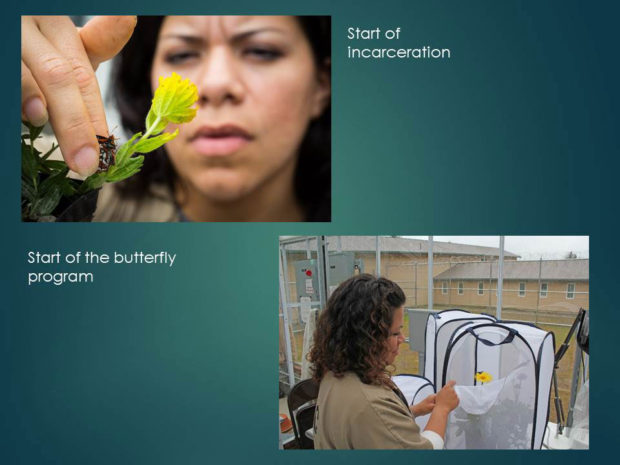By Bethany Shepler, SPP Green Track Program Coordinator and
Eugene Youngblood, Roots of Success Master Instructor

Because Youngblood is a Master Trainer for Roots of Success, he can certify new instructors. Youngblood certified Reyes (left) and Berube (center) for the program at Coyote Ridge Corrections Center in 2015 and 2017; Reyes and Berube have facilitated 7 classes of Roots students. Photo by DOC staff.
I recently had the pleasure of meeting one of our Master Trainers for Roots of Success in Washington State, Eugene Youngblood. He recently relocated from Coyote Ridge Corrections Center to Monroe Correctional Complex and spoke at a class graduation in the Sustainable Practices Lab (SPL). I was struck by his words because, not only were they relevant to the people assembled, but to so many other people inside and outside prisons. He said “to give praise is to assign value and the people here need to know that they are worthy of value.” Too often in our world, people tend to believe they don’t have value. Perhaps Youngblood is on to something: Maybe by assigning value to those we’ve locked away, we can began to change the world.

A Roots of Success class graduation at CRCC in 2016; Youngblood is at the far right. Photo by Ricky Osborne.
I want to convey more of Mr. Youngblood’s wisdom, and have a letter from him to share:
The great George Bernard Shaw said, “The reasonable man adapts himself to the world: the unreasonable one persists in trying to adapt the world to him. Therefore all progress depends on the unreasonable man.”
Sustainability in prison sounds like an oxymoron to most people, I am sure. Prisons going green and prisoners being at the forefront of this movement sounds unreasonable, if not outright unbelievable. Yet, here we are at the Monroe Correctional Complex – Washington State Reformatory Unit, attempting to adapt the world to us, understanding that all progress depends on us… “The unreasonable”.
At our SPL (Sustainability Practice Lab) we are supervised and supported by Correctional Officer Jeffrey Swan, who has done an amazing job creating an atmosphere that is both professional and positive. In these positions, we are gaining valuable job skills and invaluable knowledge that will help us in our quest for successful reentry. I would be remiss if I did not say how much support we get for programs such as this from administration here. CPM Williams continues to be the unseen helping hand, extending to us the support we need to continue the work we are able to do, even when we don’t know how far she has gone to make this all possible. We have a thriving vermiculture program, along with wheelchair and bicycle restoration programs. The wheelchairs are refurbished and restored then donated to those in need across the world. Our last three shipments went to Ghana, Guatemala, and Thailand. The bicycles are refurbished and restored then gifted to local Boys & Girls clubs, YMCA, and to the local police department for their bike drive giveaway. On top of all this work, we are learning at the same time. We have just completed the second Roots of Success environmental literacy class for Monroe Correctional Complex.
The Roots of Success program has become a real agent of change for us in prison. If you want to help people change their actions, the first thing you have to do is help them change their thoughts. How do you help someone change his or her thoughts? You provide them with more information and then you give them the tools to turn that information into knowledge. Real change takes place from the inside out – what is under the ground produces what is above the ground. Thus, we have “Roots” of success and not “Fruits” of success. Environmental literacy helps us understand the impact we have on the environment. Roots of Success helps take that to the next level with prisoners; we are learning about ourselves and the impact we have, not just on our immediate environment (Prison) but the impact we have on our friends, families, our own communities, and ultimately our extended environment (Society). We are helping to make prison sustainable, helping to contribute to the sustainability of society, and all the while helping ourselves become better people in the process by taking what we know and turning that into what we do. In the true spirit of the quote by George Bernard Shaw, we are being “unreasonable” and thus producing progress in THE world and in OUR world as well.

Youngblood (far right) stands with another graduating class from CRCC, in 2014. Photo by SPP Staff.











